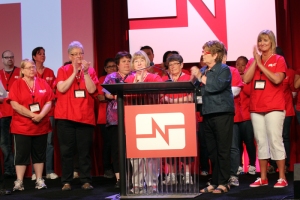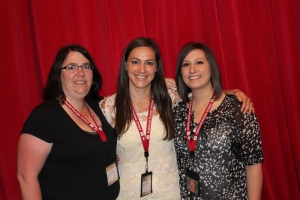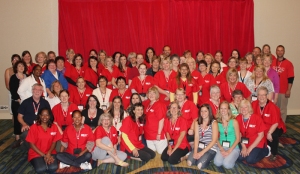files/file/Update for Steward MNA Members 061913.pdf…
Author Archives: Editor
Cancelled: June 26 Meeting for Retired MNA Members
…
ANA Unveils National Standards for Safe Patient Handling and Mobility to Spur Commitment to Culture of Safety
Nurse Fatigue Professional Issues Panel
It’s a small world after all
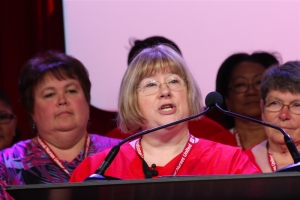
MNA President Linda Hamilton addressing the SNA crowd about the achievements nurses have made in Minnesota.
While more than 900 nurses came to San Francisco for the 2013 Staff Nurse Assembly, here the world came to them. Minnesota nurses met colleagues from Ireland, Australia, Korea, and Brazil as well as from across the US. They learned that staffing issues and budget cuts are affecting their job quality and their patients’ safety everywhere.
“We’re not alone in our struggles,” said Katie Skipton, “where we’re from, Bemidji, we can sometimes feel it’s just our problem-with staffing especially. It’s a big deal. We’re finding out that we’re not the only ones that are dealing with us, and we’re not the only ones who are fighting. ”
“It’s a global struggle,” said Fairview nurse Barbara Johnson, “and we’re united as brothers and sisters supporting each other.”
In Ireland, for example, an historic financial collapse caused leaders to implement severe austerity measures. The leader of the Irish nurse and midwife association said thousands of nurses lost their jobs. A hiring freeze on new nurses still exists. Patients are more vulnerable there and increasingly at risk. Just knowing that other nurses are fighting the same battles is assuring, nurses say, as well as empowering them and emboldening them to push further.
“Being from a very small town and a small community hospital,” said Jenna Foulk, a nurse from Marshalltown, Iowa, “it’s nice to have a bigger picture of what other nurses have gone though.”
“It’s nice to know that other facilities have the same problems we have,” said Virginia nurse Lora Sandstrom, “and we’re not the only ones who feel this way.”
“If you look at all the nurses in the world, then it becomes an even bigger force and more important that we be advocates for our patients,” said Jodi Hensley, also from Virginia.
Nurses also heard how they’ve come together to implement solutions. In California, nurses have beaten back attempted legislative repeals of ratio laws. In Australia, two territories have implemented minimum ratios. And, in Minnesota, nurses won hospital transparency that forces hospitals to report their staffing plans. What made the difference is nurses collectively fought back.
“It’s not just one person fighting against the problem,” Johnson said, “we can see that there’s thousands of people fighting those problems, and we have a better idea of how to answer those problems.”
”We so much focus on ourselves and our country that we forget that other countries have solved it. And that makes me feel that we should be able to do it,” said Foulk.
“It’s great to see all these nurses from across the country and know we have each others’ backs,” said Courtney Lucht, a nurse at Fairview, “we’ve been able to work with our legislatures and pass some bills that are really going to affect Minnesotans for the next decade.”
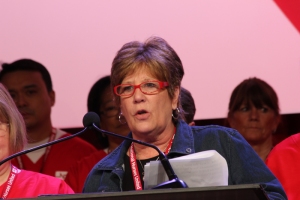
MNA Vice President Bunny Engeldorf addresses the SNA crowd about the achievements of Minnesota nurses.
“We want to make it better here,” said Kathy Winger, a Bemidji nurse, “and we can because we care about our patients, our families, our children, and grandchildren.”
Nurses from Minnesota and all over the world came together on the Golden Gate Bridge. In a literal exercise of solidarity, nurses marched from San Francisco to Marin County to protest the Keystone XL pipeline that will carry dirty tarsands crude oil from Canada to various refineries-link to video of march: http://youtu.be/nZWHF9gM3qc
“You walk across the bridge, and it’s a sea of red,” said Mercy Hospital nurse Cassandra Hamilton, “then you look back and the bridge is still completely full. And you get started on coming back, and the bridge is still full. It was amazing. Just goes to show why we’re the most trusted profession.”
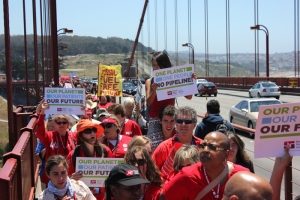
More than 900 nurses joined other unions and environmental groups in a march across the Golden Gate Bridge to protest the Keystone XL pipeline.
In educational seminars, nurses heard about tactics to push for better contracts and better patient care, such as petitions, gauntlets of nurses greeting management, and marches on the boss. In Ireland, nurses pushed for policies that dictate only RNs can wear black or white scrubs so patients know who is a Registered Nurse and who isn’t. DC nurses collected a wagonfull of 1500 concern for safe staffing forms to show the media the threat of unsafe staffing. Other ideas included buttons that read, “Registered nurse, NOT Robot nurse.”
Minnesota nurses have already implemented many of these tactics, and they’ve used them to support fellow bargaining units. In Duluth, St. Mary’s nurses were joined by Virginia and Superior nurses for the first day of bargaining. In greater Minnesota, Bemidji nurses went to Thief River Falls to support fellow Sanford nurses.
“You can face those problems alone, or you can face it together,” said Bemidji nurse Peter Danielson, “we know when we stand up and we’ve kept something bad out of another contract, we have a good chance of keeping it out of our contract.”
Staff Nurse Assembly allowed nurses to take that solidarity and extend past their unit, past their hospital, and even beyond their state. They cheered for each victory as if it were their own.
“I feel more solidarity here,” said Liz Binkert from Bemidji, “ it feels good to know there’s people supporting us. I definitely learned the lesson of what good nurses can do for your state.”
MNA NewsScan, June 24, 2013: Nurses and Hospice care; SCOTUS weakens workers’
NOTES ON NURSING
Approaching Death A nurse goes from the ER to a hospice, and changes the way she thinks about life and its end.
AACN Issues Practice Alert on Alarm Management A new practice alert from the American Association of Critical-Care Nurses outlines evidence-based protocols to reduce false or non-actionable alarms and improve the effective use of these monitoring aids.
LABOR UPDATES
Supreme Court Weakens Chances of Workers Winning Employment Discrimination Cases By restricting who counts as a supervisor, the Court has handed employers a victory.
HEALTH CARE NEWS
Health of U.S. Children Improves, But More Live in Poverty ”The progress we’re seeing in child health and education is encouraging, but the economic data clearly speak to the considerable challenges we still face,” said Laura Speer, associate director for policy reform and data for the foundation.
For-Profit Musical Chairs: Tenet announces plan to purchase Vanguard
The MNA has just learned that Tenet Healthcare, one of the nation\’s largest for-profit hospital chains, is buying Vanguard Health Care, another for-profit chai…
National Alert: Important Change with Heparin Labels
Navigating Nursing Webinar: Funding Quality Initiatives on your Unit
There Is No Other Planet We Can Go To
With the magnificent expanse of the Golden Gate Bridge as backdrop and pathway, nurses from across the U.S. rallied on Thursday to call an end to the Keystone XL Pipeline project, a ghastly effort to transport poisonous tar sands 1,700 miles from Canada to Texas, exposing hundreds of communities en route to calamitous spills, ruined water systems and deleterious health effects. Nurses also called for an end to the politics of austerity, one that puts the false choices – jobs through environmental degradation – before us.
“Nothing related to Keystone XL is good for our families, our communities, or our planet,” announced Debra Burger, RN and NNU co-president from the rally stage. “From extraction to transport to refining, tar sands oil will exacerbate our current health emergency…. This is a clear and present danger to public health.”
Burger spoke before a gathering of 1,500 nurses and environmental activists, including members of 350.org, Greenpeace, Credo Action, Sierra Club, Asian Pacific Environmental Network, Friends of the Earth, Rainforest Action Network and others. Their colorful signs told the story: “Clean Energy Creates Jobs” and “One Planet, One People, No Pipeline”.
Brenda Prewitt, RN and NNU member, traveled from Houston to join in. She’s a pediatric nurse with 25 years on the job. “We have a lot of kids with respiratory issues coming in everyday. We have ozone alerts all the time. Another pipeline increases the issues we already have.”
NNU opposes the Keystone XL Pipeline (KXL) because of the adverse health and environmental impact on communities along the proposed route, as well as how the emissions from tar sands will lead to climate change that affect public health more broadly.
Earlier in the day, before nurses gathered for this year’s Staff Nurse Assembly in San Francisco, California Governor Jerry Brown acknowledged that climate change and inequality top the world’s agenda. “There are no bigger issues today,” he said, “then the growth of inequality and the continued destruction of our environment.” He likened climate change to “a tsunami coming at us.”
“Of all the unions I’ve been talking to,” said the California governor in a compelling salute to our members, “nobody has a better global vision than the nurses.”
A green economy makes dual sense: growing the economy and keeping communities healthy. Approval of KXL would further entrench the corrosive power of the fossil fuel industry in distorting U.S. public policies.
Before the rally wrapped up and nurses and supporters headed across the Golden Gate Bridge, as planned, to continue the protest against KXL, a spirited rendition of “Heard It Through the Grapevine” was delivered by Kat Taylor, CEO of One Pacific Coast Bank. Her lyrics, “Heard It Through the Pipeline… Not much longer will you be my world” was a crowd pleaser. Taylor saluted the “calling of nurses” and its “imperative of stopping the Keystone Pipeline”.
SF climate activist, businessman and Obama supporter Tom Steyer, is pressing the president to nix KXL. Steyer commissioned a study carried out by the Environmental Working Group that was released today in Washington, D.C. It is a scathing indictment of tar sands, its extraction and transport. The study sets out independent lab tests of a sample from a tar sands spill earlier this year in Arkansas that detected several highly toxic chemicals. “A single sample of tar sands oil included chemicals that cause cancer in humans and produce serious and permanent birth defects in children,” said Renee Sharp, director of research of the Environmental Working Group.
Among the chemicals detected in the sample were benzene, xylene, chromium and lead, which are known carcinogens and injurious to the nervous system, according to the study.
With kites hugging the air above the bridge, a sailboat beneath outfitted with banner, protesters cheering and chanting — “We are unstoppable, A healthy world is possible! – nurses and supporters, a group extending hundreds of yards crossed the Golden Gate Bridge on its pathway. Madison Davis, a college student and environmentalist from San Jose was there with the nurses. “This is the one chance we have to stop major oil companies. Obama is going to lose a large amount of support if he allows Keystone to be built. It would be a tragic mistake,” she said. “There is no other planet to go to.”
